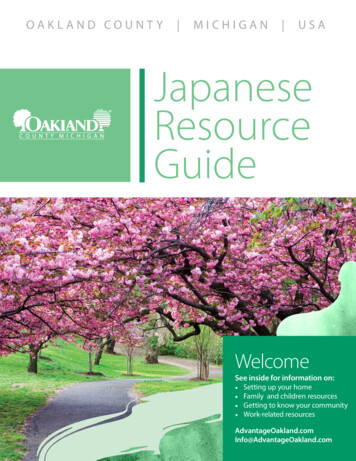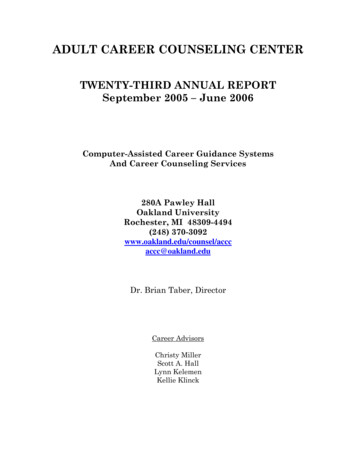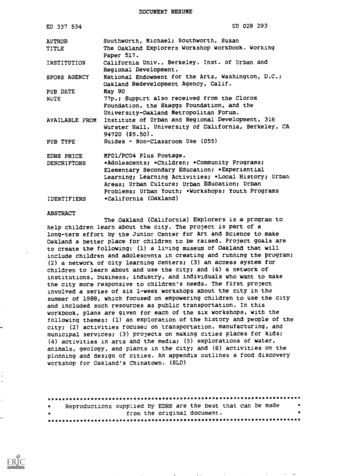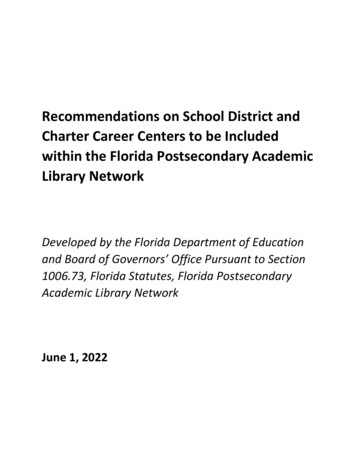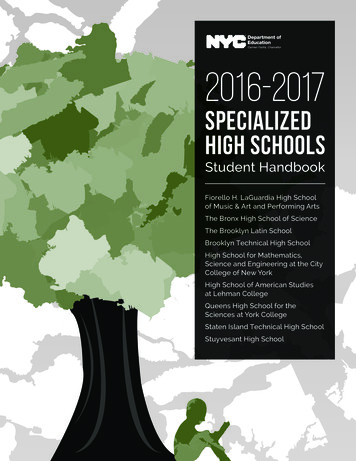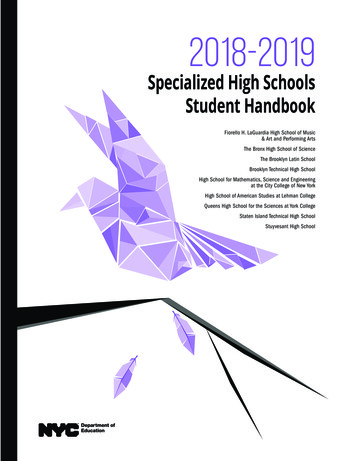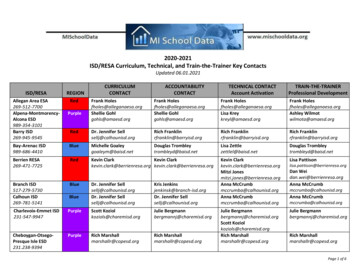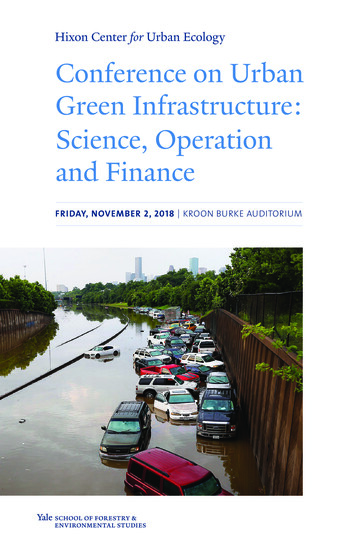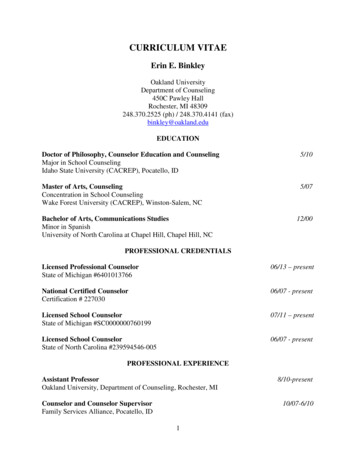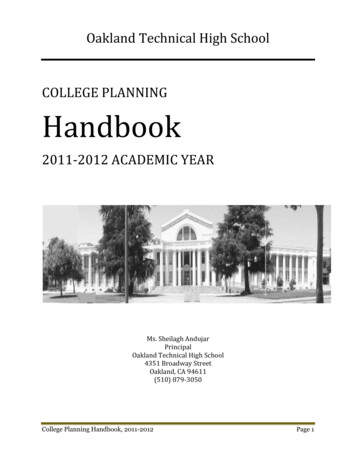
Transcription
Oakland Technical High SchoolCOLLEGE PLANNINGHandbook2011-2012 ACADEMIC YEARMs. Sheilagh AndujarPrincipalOakland Technical High School4351 Broadway StreetOakland, CA 94611(510) 879-3050College Planning Handbook, 2011-2012Page 1
AcknowledgmentsThis handbook was written to help students throughthe college admission process. It will serve as a guide inthe daunting task of selecting and applying to college.Much of the material in this handbook draws on a widevariety of college resources and information providedin the College Admission Counseling Program at UCBerkeley Extension.Special thanks to the College Mentor Committee andPTSA for the mini-grant to print copies of thishandbook for every senior.Thanks to Ms. Jeannette McClendon, SFSU for helpingwith the Frequently Asked Questions About CSUs.Thanks to Oakland Tech administrators and teacherswho have the ongoing task of educating our youth andpreparing them for the future ahead.Jacqueline JohnsonPhil MagroCase Load: Student Last Names: A-HaPhil.Magro@ousd.k12.ca.usCounselor/Cal Grant CoordinatorRoss YokomuraCase Load: Student Last Names: Hb-ORoss.Yokomura@ousd.k12.ca.usHead CounselorJacqueline JohnsonCase Load: Student Last names: ege Admissions CounselorCollege Planning Handbook, 2011-2012Page 2
Table of ContentsCollege Counseling Programs.4College Planning Calendar 2011-2012 .5Step One: Admission Process1. Transcript . .2. Grade Point Average . 3. A-G Required Courses . . 8810Step Two: Searching For SchoolsKuder Navigator Narrowing Down the List of Schools . .1213Step Three: Choosing the Right CollegeAbout College Myths . . .1. California Community Colleges . Certificate of Completion or Certificate of Skills Programs 2. California State University . . .Unique Program(s) at CSUs Frequently Asked Questions About CSUs .3. University of California . .4. Private Colleges .1415161718192022Step Four: National Collegiate Athletic Association (NCAA) . .25Year By Year College Search .26Step Five: Financial AidGrants .Work Study .Loans .Scholarships . .27272727AppendixCSU Eligibility Index – California Residents .2011-2012 SAT and ACT Test Dates .SAT AND ACT Comparison Chart .References & Websites. NCAA Freshman-Eligibility StandardsIndependent California Colleges and UniversitiesWestern Undergraduate Exchange (WUE) schoolsHistorical Black Colleges and UniversitiesThe Common ApplicationCollege Planning Handbook, 2011-201228293031Page 3
College Counseling ProgramsAdditional college counseling programs are available in the College and Career Center located in theback of the library.Educational Guidance Center (EGC) – UC BerkeleyEGC College Advisors work with individuals and groups of students at high school campusesassisting them in their efforts to pursue a post-secondary education. Transcript evaluations, courseplanning and referrals assist high schools students to remain in school, graduate and matriculateinto some form of postsecondary education after graduation. EGC offers college applicationworkshops and field trips to colleges. Application required. Contact: Susan Payne, College Advisor,skpayne@berkeley.edu. Location on campus: College and Career Center (Library), Tuesdays,Wednesdays, & Thursdays.Early Academic Outreach Program (EAOP) – UC BerkeleyEAOP prepares students from under-resourced communities for admission to colleges anduniversities. Students who maintain a 2.5 GPA or higher in their college preparatory courseworkare eligible to apply to the program. Priority is given to students from low-income families and/orstudents who will be the first in their family to go to college. Contact Israel Hernandez,hernanize@gmail.com. Location: College and Career Center (Library), Fridays.Upward Bound (UB) – UC BerkeleyUpward Bound provide opportunities for participants to succeed in pre-college performance andultimately in higher education pursuits. UB provides academic support, college motivation andcounseling, career advising, social/cultural activities, and detailed college admission assistance.During the school year participants also attend Saturday classes, which include academicenrichment, tutoring, and pre-college skills development. UB offers field trips, and a six-week,summer residential program. Students must be in 9th or 10th grade, and must be low-income andfirst generation eligible. Location: College and Career Center (Library),UC Berkeley Upward Bound Program Contact: Tom Nishi, nishi@berkeley.edu (Fridays)Mills College Upward Bound Program Contact: Lauren Slykhous, lslykhous@mills.edu. (Tuesdays &Wednesdays)Destination College Advising Corps (DCAC)DCAC provides comprehensive college awareness, preparation and advising to make college aviable option for all students. DCAC assists students with preparing for college, collegeapplications, and applying for financial aid (FAFSA) and scholarships. The DCAC college advisorwill also provide intensive individual advising and follow-up activities to a cohort of students(Application Required) in grades 9-12. No application required for drop-in advising. Contact:Chaney Saephan, chaneysaephan@berkeley.edu.College SummitCollege Summit builds the capacity of schools to dramatically increase college-going school anddistrict-wide culture. Peer Leaders support peers in writing personal statement, create a collegelist, and complete college application. Mr. Brooks visits government classes on Wednesdays. Formore information, contact: Damien Basey at dbasey@collegesummit.org.References: College and Career HandoutCollege Planning Handbook, 2011-2012Page 4
College Planning Calendar 2011-2012August – SeptemberSeptember 9: Registration deadline for October 1 SAT/Subject TestsSeptember 16: Registration deadline for October 22 ACT TestSeptember 17: People’s Test Prep Services (PTPS) will offer ACT Prep Classes, from10:00am-2:30pm at UC Berkeley Evans 81, start date: 9/17/2011.September 20: PTPS will offer SAT Prep Classes at Oakland Tech from 3:30pm-5:30pmon Tuesdays and Thursdays in Room A5.Research and finalize Early Action or Early Decision Plan (apply in October)Continue working on drafts of UC and private college personal statement/essaysRead the monthly Oakland Tech College News Letter for upcoming visits from collegerepresentatives and important college information.Complete the Cal Grant form and give it to Mr. Magro.OctoberOctober 1: Begin work on CSU applications. CSU application period is from October 1through November 30th. Create an account on the CSU Mentor website:www.csumentor.org.October 3: Contact teachers and counselors to ask them to write a recommendationletter (Remember: UCs and CSUs DO NOT NEED A RECOMMENDATION LETTER). Pickup aRecommendation Form from your counselor.October 3: Incentive Awards Program (IAP) meeting, from 1:30-2:30pm, held in theOakland Tech Library. IAP provides up to 32,000 in scholarship funds over eightsemesters to support low-income, first generation college students. Seniors and Juniorswith 3.5 GPA (unweighted) should attend.October 5: Yale Information Session, from 7pm-9pm, held in the Oakland Tech Library,Alexander Richardson, Yale Admission Officer presenting.October 7: Registration deadline for November 5 SATOctober 8: SAT Prep Review, Saturday, from 10:00am-2:00pm at DeVry University,Oakland Center, 505 14th St., Oakland. Free.October 10 & 11: College Awareness Classroom Presentations, Oakland Tech CollegeCollaborative (EGC, EAOP, Upward Bound, DCAC, Tech Counselors & Others) will visitEnglish 4 classes to provide college information.October 10: Spring 2012 Annual HBCU College Tour kick-off - sign-up with Ms. Hopson,Room 235. Cost per student: 495.00. 100.00 Deposit Due Now and Final payment dueno later than March 1st, 2012.October 12: PSAT All sophomores take test (Free). Juniors should take test for (NMSQT).The cost is 14.00.October 13: Personal Statement Workshop, lunchtime, held in the Oakland Tech Library,sponsored by Oakland Tech College Collaborative.October 13: Road to College: Part I, “Admission Process” with Brian O’Rourke, HolyNames College, from 7:00pm-9:00 pm, held in the Oakland Tech Library, sponsored byCollege Mentor Committee.October 15: PTPS offers Mock SAT, from 9:00am-1pm at YMCA-PG&E Teen Center,located at 2111 Martin Luther King Jr. Way, Berkeley, CA 94704. Free of Charge.October 15: The 34th Annual College Information Day @ UC Berkeley on October 15th,UC Berkeley Wheeler Hall, 8:30am – 1:00pm. Over 60 public and private colleges anduniversities representative will be present. There will be workshops on admissionrequirements, financial aid, and scholarships, college presentations, and much more. Preregister online at www.eastbayconsortium.org.College Planning Handbook, 2011-2012Page 5
October (continued)October 19, 20 & 21: Pre-Transcript Advising, all day, held in the Oakland Tech Library,sponsored by Tech College Collaborative.October 20: Road to College: Part II, “Financial Aid Planning,” with Mr. Brian O’Rouke,Holy Names College, from 7:00-9:00pm, held in the Oakland Tech Library, sponsored byCollege Mentor Committee.October 22: PTPS offers Mock ACT, from 9:00am-1pm at YMCA-PG&E Teen Center,located at 2111 Martin Luther King Jr. Way, Berkeley, CA 94704. Free of Charge.October 27: DeVry’s Passport2College Program, offers No Cost, college level courses forcredit while still in high school.October 29: PTPS offers College Gateway Workshop, from 10:00am-12:00pm at YMCAPG&E Teen Center, located at 2111 Martin Luther King Jr. Way, Berkeley, CA 94704. Free ofCharge. This workshop will cover the college application process.Finalize drafts of essays for UCs and any private collegesWork on scholarship applications (check-out: oaklandtech.com/scholarship, fastweb.com,finaid.org, and scholarship drawer, etc)If you will be a recruited athlete, complete process for NCAA Eligibility Center. See Mr.Yokomura about NCAA Eligibility requirements.October 31: Early Decision application deadline for Cal Poly SLO (early decision)NovemberNovember 1: UC application period opens for Fall. Begin work on UC applications ber 2: Personal Statement Workshop, lunchtime, held in the Oakland TechLibrary, sponsored by Oakland Tech College Collaborative.November 2, 3 & 4: College Crunch Days. Get help with your college applicationsubmission process from Tech College Collaborative. Bring your transcript, personalstatement draft, test scores, and parent income information. Workshop will be held in thelibrary – all day.November 3: College Presentation “How to Make Yourself Irresistible to a GoodCollege and Get Plenty of to Go,” presented by Ms. Barbara Austin, College Advisor,College Quest, from 6:30pm-8:30pm, Oakland Tech Library.November 4: Registration deadline for December 10 ACT TestNovember 5: PTPS offers Mock SAT, from 9:00am-1pm at YMCA-PG&E Teen Center,located at 2111 Martin Luther King Jr. Way, Berkeley, CA 94704. Free of Charge.November 8: Registration deadline for December 3 SAT/Subject TestsNovember 19: PTPS offers Mock ACT, from 9:00am-1pm at YMCA-PG&E Teen Center,located at 2111 Martin Luther King Jr. Way, Berkeley, CA 94704. Free of Charge.November 21, 22, & 23: Drop-in – East Bay Consortium, get help with collegeapplication during Thanksgiving Break, EBC located at MetWest High School, first floor inthe Harper Building, 314 E. 10th Street, Oakland (510) 879-4654.November 30: UC and CSU application deadlines!Send official test scores to your colleges if you have completed testsDecemberComplete all private colleges and universities applicationsMake sure you send official test scoresRemember Fall Semester grades count towards your overall high school GPA!Apply for pin # for FAFSA (www.pin.ed.gov)College Planning Handbook, 2011-2012Page 6
JanuaryJanuary 1: Priority application period opens to submit FAFSA and Cal Grant GPAVerification Form (opens Jan 1 through March 2). Visit: www.fafsa.ed.govJanuary 4: College Alumni Reunion, Wednesday, January 4, 2012, TBA.January 31: Senior Financial Aid Workshops (Cash for College), from 6:30pm to8:30pm, held in the Oakland Tech Library.Complete FAFSA with parentsContinue applying for scholarships via Fast Web, Oaklandtech.com/scholarship, check thescholarship drawer located in the counseling department, and other sourcesFebruaryKeep your grades up! Schools will not accept Ds and Fs! Applications may be rescinded!MarchMarch 2: Deadline for submitting FAFSA for Cal Grant.Students should sign up early to take ELM &EPT placement tests for CSU admission. Thesetests may be waived if you have the following scores or are EAP exempt: SAT 1 (Math 550,Verbal/CR 550) or ACT (Math 23, English 22). Cost: 18.00 per test.Register at: www.testing.csueastbay.eduAdmission letters from UCs, CSUs and private colleges arrive.Review financial aid options.Once admitted, keep updated on housing applications/reservations, placement testing andany form deadlines.AprilCollege Visit: Attend the 13th Annual Shadow Day at UC Berkeley. Shadow Day will givestudents the opportunity to learn first-hand, from UC Berkeley students, what college isreally like. See Ms. Johnson for details.College Visit: HBCU College Tour, date TBAMake sure all paperwork is submitted and on time to your chosen campus!Senior Community College Workshops, date TBAMayMay 1: National Candidate’s Reply Date – deadline to notify colleges of yourdecisions. You must accept one offer, even if waitlisted at other schoolsScholarship Ceremony, date TBA.Contact all other colleges where you were admitted and withdraw your admissionRemember to keep your final semester grades up! If your grades fall, admission may berescinded!JuneSend final transcript to the college you have chosen. Fill out form with Ms. Nona Conocono,Recorder, Room 120 and OUSD will send transcript during the summer.College Planning Handbook, 2011-2012Page 7
Step One: Admission ProcessYour transcript is the number one indicator of college success. You should know how toread your transcript and understand the grading system used to calculate your grade pointaverage.1.2.Transcript – The transcript is a snap shot picture of your academic achievementfrom grades nine through twelve. At the top of the transcript, you will find yourpersonal information, name, student number, grade, date of birth, and permanentidentification. You should make sure that all information is accurate before sendingto a college. The body of the transcript is divided into semesters. There are twosemesters for each school year. Some of your courses are tagged with a * whichapply to non academic courses and for honors and advanced placement courses.The bottom of the transcript has the summary information for credit, grade pointaverage, and test data.Grade Point Average (GPA) - There are two grade point averages (GPAs)shown on the transcript.Unweighted GPA: The unweighted GPA includes all grades received in all courses. Forexample, the GPA will include grades from P.E., and other courses that are not collegepreparatory courses. A 4.0 is the highest GPA possible in an unweighted calculation.Unweighted GPAA 4 pointsB 3 pointsC 2 pointsD 1 pointsF 0 pointsWeighted GPA:The weighted GPA gives an extra grade point for UC-certified Honors,Advanced Placement (AP) and International Baccalaureate (IB) classes.Weighted GPAA 5 pointsB 4 pointsC 3 pointsD 1 pointsF 0 points(No extra point is given for “D” grades)College Planning Handbook, 2011-2012Page 8
Notes: Weighted Academic GPARemember that the weighted academic GPA has only grades from collegepreparatory courses (a -g courses). For example, do not use PE, IWE, and otherclasses that do not have a “P” shown next to course on transcript.Calculate only grades earned in the 10th through 12th.You must have Cs or better in all classes used to calculate your GPA.If you earned a D in an AP (Advanced Placement) course, only give yourself 1 point.Notes: CSU RequirementMinimum of 2.0 requiredOakland Tech students are eligible for admission to CSUEB and CSUSF, if they meetthe minimum GPA, test scores, and A-G Requirements.If you do not live in the service area of the CSU you apply to, and it is impacted, ahigher admission standard may be used.At UCs and CSUs, as well as many private colleges, the GPA is considered incombination with the student’s SAT or ACT scores: the lower the GPA, the higherthe test scores(s) required. For the CSU system, only the GPA and SAT or ACT isused to determine eligibility.Notes: UC RequirementMinimum of 3.0 requiredMost UC campuses use your grades, test scores, extracurricular activities, and levelof courses to determine eligibility.Most UC’s go through a Holistic Review of your transcript before they notify you thatyou have been accepted. Check your email account often for correspondence,deadline dates, and additional information needed from colleges.It is important to earn good grades in the 12th grade because you are accepted on aconditional basis and your final transcript will be reviewed.College Planning Handbook, 2011-2012Page 9
3.A-G Required CoursesAll students planning to apply to colleges and universities must fulfill the “a-g”requirements. The “a-g” requirements are a specific pattern of courses (outlined below)which are required for admittance to the UC and CSU systems.University of California (UC)California State University (CSU)a.b.c.d.e.f.g.History/Social Science: 2 years required(World History, U.S. History, AmericanGovernment)English: 4 years required of college preparatoryEnglish (you may include up to 1 yr of higherlevel ESL/ELD)Mathematics: 3 years required, 4 yrsrecommended of college preparatory mathincluding algebra, geometry and advancedalgebra. (Courses taken in the 7th and 8th gradesmay be used to fulfill part of this requirement ifyour high school accepts as equivalent to its ownmath courses.)Lab Science: 2 years required, 3 yearsrecommended. (Biology, Chemistry, Physics).Language other than English: 2 years of thesame language required, 3 years recommended.(Courses taken in the 7th and 8th grades may beused to fulfill part of this requirement if yourhigh school accepts them as equivalent to its owncourses.)Visual and Performing Arts (VPA): 1 yearlongapproved arts course from a single disciplinerequired, chosen from the following: dance,drama/theatre, music, or visual arts.College Preparatory Electives: 1 yearrequired, chosen from the following areas: VPA(non-introductory level courses), history, socialscience, English, advanced math, lab science, andlanguage other than English (a third year in thelanguage used for “e” requirement, or two yearsof another language).a.b.c.d.e.f.g.History/Social Science: 2 years required(American Gov. U.S. History, or Social Science)English: 4 years required of college preparatoryEnglish (you may include up to 1 yr of higherlevel ESL/ELD)Mathematics: 3 years required, 4 yrsrecommended of college preparatory mathincluding algebra, geometry and advancedalgebra. (Courses taken in the 7th and 8th gradesmay be used to fulfill part of this requirement ifyour high school accepts as equivalent to its ownmath courses.)Lab Science: 2 years required including onebiological science (biology, physiology), and onephysical science (Chemistry, Physics).Language other than English: 2 years of thesame language required, 3 years recommended.(Courses taken in the 7th and 8th grades may beused to fulfill part of this requirement if yourhigh school accepts them as equivalent to its owncourses.)Visual and Performing Arts (VPA): 1 yearlongapproved arts course from a single disciplinerequired, chosen from the following: dance,drama/theatre, music, or visual arts.College Preparatory Electives: 1 yearrequired, chosen from the following areas: VPA(non-introductory level courses), history, socialscience, English, advanced math, lab science, andlanguage other than English (a third year in thelanguage used for “e” requirement, or two yearsof another language).GPA Requirement: Minimum of 3.0.GPA Requirement: Minimum of 2.0.Exam Requirements: 1) The SAT Reasoning Test orACT Assessment plus writing. (The best test scoresfrom the same sitting will be used to determine youreligibility. 2) SAT II aren’t required; but, they arerecommended for certain selective majors. TwoSAT Subject Tests in two different subject areas,chosen from the following: history, literature,mathematics (level 2 only), science, or languageother than English.Exam Requirements: The ACT Assessment or theSAT Reasoning Test. CSU does not use the SAT orACT writing test score for admission purposes. Youmay use the best score earned in individual testdates.College Planning Handbook, 2011-2012Page 10
Step Two: Searching For SchoolsYou may already know the colleges that you want to apply to. You may have taken into accountthe location, programs, and environment. If you are not sure how to search for a college, do acollege search assessment which will ask questions that will help you narrow down your search.Keep in mind the following when searching for the right fit college:Colleges. Do you want to attend: A. University of California (UC) B. California State University (CSU) C. Historical Black College University D. Out of State College E. Private College/University F. Community College G. Technical School H. Trade/Vocational SchoolAcademics. Does the school offer the majors, minors that I am interested in? Do theyoffer study abroad programs?Cost to Attend. Can I afford this school? What is my EFC? How do I apply for financialaid? Where can I get scholarships?Extracurricular Options. What clubs or organizations are available? How hard is it tojoin a sports club? Do they have volunteer opportunities? Are there opportunities to getinvolved in community activities?Housing. Will I be guaranteed housing? Are there apartments available on campus? CanI afford to live on campus? Are dorms coed? What is the housing like?Learning Environment? How large are the classes? Will I be able to get to know myinstructor? What do other students say about the instructors?Location. Do you want to go to a college that is close to home? Do you want to go tocollege in California? Do you want to go to a college in a large city? Do you want to go toa college with diversity?School Spirit. Is it important to attend a school with a NCAA sports team? Do you wantto go to a college that has lots of sports?Setting of Campus. What type of college setting would you prefer: urban, rural, orsuburban?Size. Keep in mind that schools come in all sizes. What size campus is right for you?College Planning Handbook, 2011-2012Page 11
Kuder NavigatorThe Kuder Navigator assessment can help you locate colleges and careers that are right for you.Kuder Navigator is a user-friendly, internet-based, education and career planning tool for OaklandTech high school students. It can be accessed from home and school. It is free to you. Once you haveregistered, it is yours to use from now on.Getting Started1. Go to www.kudernavigator.com2. In the top right of the web page, click on New Users Register Here3. On the next page, select “Student” and enter grade level.Creating an Account1. Personal Information: name, address, date of birth, graduation year, and expected level ofeducation. You do not have to enter your student ID number.2. Create an Account: Enter your home address, phone number and cell number. An email addressis required.3. Username and Password: Create a username and password.4. Activation Code: N3292669XTXTake an Assessment1. Go to Learn About Myself tab at the top of the page2. Click on Take an Assessment.3. Take the Kuder Career Search with Person Math Assessment. This assessment will ask you torank activities that you like best from 1-3.Plan for Education1. Once you have completed an assessment, you can click on Plan for Education tab at the top ofthe page.2. Click on “National Schools”3. View schools that meet your criteria using the filter options.4. See list of schools meeting your criteria.5. Click on gold star to save to your portfolio.6. Click on school to learn more about general campus information.Explore Occupations1.2.3.4.Click on Explore Occupations tab at the top of the page.Click on “Explore Careers by Assessment Results.”Click on the career title and learn more about it.You may want to search a career that you already have in mind. Click on the ExploreOccupations” tab at the top of the page, then select “Explore Careers by Title or KeywordSearch.College Planning Handbook, 2011-2012Page 12
Narrowing Down the List of Schools (include safety, target, and reach schools)A safety school is a college that you are certain you will be admitted into, that your familycan afford even if you do not get significant financial aid, and that you are willing to attend.A target school is a school you really want to attend and matches your admission profile.A reach school is one that you strongly desire to attend but realize the chances of gettingaccepted are slim.List at least three SAFETY schools:1.2.3.Application Deadline DateList at least three TARGET schools:1.2.3.Application Deadline DateList at least three REACH schools:1.2.3.Application Deadline DateAdditional Tasks:Teacher Recommendation LetterCounselor Recommendation LetterSecondary School ReportMid-year ReportTranscript sentEssay CompletedFinancial Aid form completedCSS Profile completedLetters of acceptance/denial/waitlist receivedCollege Notified of Student Intent to Register (SIR)Housing applied forDeposit given if requestedPlacement tests scheduledOrientation scheduledCollege Planning Handbook, 2011-2012Page 13
Step Three: Choosing the Right Fit CollegeAbout College MythsThe four years that youth spend in college can either awaken their abilities and talents or theycan become frustrated with the experience and transfer, drop out, or flunk out. Some of theproblem has to do with finding the right fit college. The following are a few college myths thathave been around for years.College MythsThis is an excerpt based on Chapter 1 of the book Looking Beyond the Ivy League: FindingThe College That’s Right For YouMyth: AN IVY OR LITTLE IVY COLLEGE* WILL ABSOLUTELY GUARANTEE THE RICH,FULL, AND SUCCESSFUL LIFE.Not necessarily. Even if the diploma helped you get the first job because it was taken asevidence of your intelligence that would be about the limit of its leverage because mostpeople change jobs at least once in the first five years. Five years out of college, or sooner,a person’s own qualities will be deciding whether he/she gets a raise, promotion, or hasthe vision to see new opportunities and the imagination to create a new career.Myth: A BIG UNIVERSITY OFFERS A BROADER, RICHER UNDERGRADUATE EXPERIENCEWITH BETTER TEACHING, WIDER COURSE SELECTION, AND A MORE DIVERSE STUDENTBODY THAN A COLLEGE.Quite the opposite! The university is primarily interested in research, publishing,consulting, and graduate teaching. Even some of the greatest universities leave over 70percent of the freshman and sophomore instruction to graduate assistants. In addition,budget crunches have made it difficult to get even the required courses that in many toppublic universities it takes five and a half or six years to get a degree.Myth: YOU SHOULD MAKE YOUR COLLEGE SELECTION EARLY IN YOUR SENIOR YEARAND HAVE ALL YOUR APPLICATION IN BY CHRISTMAS OR THEREABOUTS (CSU ANDUC’S DEADLINES ARE NOVEMBER 30).The sky does not fall on November 30th. Many colleges use rolling admissions – acting onapplication as they come in. Many colleges are taking students into the summer,depending on the flow of applications. But, if you applying to one of the colleges oruniversities that have a firm deadline date, you had better be prompt at getting in yourapplication!*The eight universities constituting the Ivy League are Brown, Columbia, Cornell, Dartmouth (which calls itself a college)Harvard, Pennsylvania, Princeton, and Yale. The little Ivies are Amherst, Wesleyan, and Williams.College Planning Handbook, 2011-2012Page 14
There are four major systems of higher education in California. The California CommunityCollege courses are available to students in high school through concurrent enrollment as well asfor students 18 or over and for students who have graduated from high school. California StateUniversities, Universities of California, and Private Colleges are available for students who havecompleted high school and have met the admission requirements.1. California Community Colleges (CCC) - There are 112 CCC’s in California of which 10are in the Bay Area: Merritt, Laney, City College of Berkeley, Contra Costa College, LosMedanos, Diablo Valley, San Francisco City College, and Ohlone College. Onlineinformation can be found at www.cccco.edu. Click the “Community Colleges” tab to getgeneral information and find links to individual colleges.California Community Colleges need:The student must be 18 years of age, or be a high school graduate. A GED or CaliforniaHigh School Proficiency Exam is acceptable.No Application feeStudents must take a placement test a Math Assessment Test and an EnglishAssessment Test. These tests are given at the Community College.Tuition and FeesCalifornia Resident Fees and/or tuition (excluding room and board). Approximately 624 per
in the College Admission Counseling Program at UC Berkeley Extension. Special thanks to the College Mentor Committee and PTSA for the mini-grant to print copies of this . Saturday, from 10:00am-2:00pm at DeVry University, Oakland Center, 505 14th St., Oakland. Free. October 10 & 11: College Awareness Classroom Presentations, Oakland Tech College
